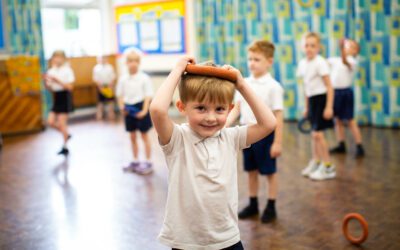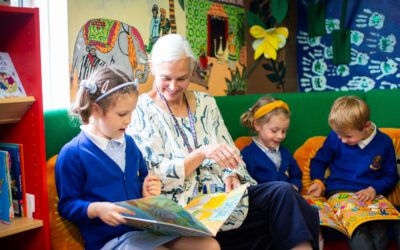St. Anne’s CVA Foundation Stage
Foundation Stage Curriculum Intent Statement
At St. Anne’s CVA, we believe that the Early Years Foundation Stage is crucial in securing solid foundations that children are going to continue to build upon.
It is our intent that the children who enter our Foundation Stage develop physically, verbally, cognitively and emotionally whilst embedding a positive attitude to school and learning. We believe that all children deserve to be valued as an individual and we are passionate in allowing all children to achieve their full, unique potential. With all of this in mind, we begin each new year by looking at the individual needs of our children and taking into account their different starting points. By using the statutory framework for the early years foundation stage, we have planned an EYFS Curriculum which is flexible and enables pupils to follow the path of their learning journey, at a point, that is suitable for their unique needs and stage of development.
Children in the Foundation Stage class follow the EYFS 2021 curriculum, which has seven main areas of learning.
The Prime Areas
- Personal, Social and Emotional Development
- Communication and Language
- Physical Development
The Specific Areas
- Literacy
- Mathematics
- Understanding the World
- Expressive Arts and Design
The teaching of these areas of learning is practical and playful with support and challenge from adults in class sessions, small group sessions and working with individuals. There is a combination of adult-led, teacher taught sessions as well as a wealth of stimulating continuous provision opportunities. Throughout all of these areas of learning and at the heart of the EYFS Curriculum are the “Characteristics of Effective Learning”.
At St. Anne’s, we strive to develop these key characteristics of “Playing and Learning”, “Active Learning” and “Thinking Critically” in order to give the children the skills that they will continue to draw upon throughout their development. All of the crucial skills, knowledge and vocabulary that we teach are presented to the children throughout the year which encompasses a range of topics, that are designed with their interests in mind.
Our learning environments, both inside and outside are also adapted regularly to meet the different and developing needs of the children in our care. We aim to ensure that these areas are always stimulating and exciting and that, importantly, they are accessible to all children, regardless of where they are on their learning journey. The environments are developed to promote independence within our children and allow them to access the curriculum independently and confidently with the necessary level of support and challenge.
Within our EYFS Curriculum, children are assessed continuously through accurate and important observations. The information provides us with information for future planning, not only for our class but also for individual children’s next steps in their learning. It enables us, as EYFS practitioners, to ensure learning is embedded and consistent and that all children continue to make outstanding progress within our Foundation Stage setting.
In September 2020, we trialled the EYFS 2020 (Pilot) and began the new EYFS in September 2021. The expectations for a good level of development have been changed, along with the age brackets for development,
- Birth to 3,
- 3-4 years,
- Reception
- Early Learning Goal.
Our school is part of the Early Adopters CMAT working party. We are currently working on collaborative documents for the expectations for our children for each term of the year, to actively promote a GLD. These documents PITA- (Period In Time Assessment) form our assessment criteria to track the children’s progress.
Implementation Statement
Pupils learn through a balance of child-initiated and adult-directed activities and challenges. The weekly timetable is carefully structured so that children have rigorous directed teaching in English, Mathematics and Phonics every day. We also ensure regular Circle Time sessions to focus on C&L and PSED and Topic sessions to focus UW and EAD in our weekly timetable.
These sessions are followed by group work where children work with a member of staff to develop their individual targets. This focused group time enables teaching staff to systematically check for understanding, identify and respond to misconceptions quickly and provide real-time verbal feedback which results in a strong impact on the acquisition of new learning.
Children are provided with plenty of time to engage in ‘exploration’ throughout the variety of experiences, which is carefully planned to engage and challenge them in the provision. The curriculum is planned for the inside and outside learning environments and is planned in a cross-curricular way to enable all aspects of the children’s development including UW and EAD as well as to promote sustained thinking and active learning. The children have opportunity for ‘child-led’ planning sessions are conducted to ensure that the children have agency over their environment and that the provision leads to depth of learning across all areas of the curriculum.
Our inclusive approach means that all children learn together but we have a range of additional intervention and support to enhance and scaffold children who may not be reaching their potential or moving on children who are doing well. This includes, for example, additional time, experiences and support with pre-teach and post-teach activities. The next steps for the children are identified and the Foundation Stage team use this to support the children with their learning.
Our regular monitoring of teaching and learning includes: feedback from the curriculum and assessment leaders and current, relevant training and professional development so that teachers and support staff develop a good subject knowledge and are effectively supported. We have frequent moderation opportunities with local clusters and CMAT clusters along with the moderation in house with the teachers at our school, particularly with the Year 1 teacher.
Impact Statement
We aim to ensure all children progress through a balanced and creative EYFS curriculum. We strive to ensure each child makes a very good level of progress through the Early Learning Goals, from their individual starting points. All children get the best possible start to their school life and develop the knowledge and skills to reach and exceed their potential in KS1. To check that we are achieving this we take the following measures;
Class teachers record observations and photographs of each child whilst learning and playing. This is recorded using Evidence Me software on a I Pad and linked to the Early Learning Goals. These observations are used to help teachers make formative assessments and inform potential next steps for each child, this includes careful consideration of children with SEND or are who are disadvantaged.
- Summative assessments are completed termly to judge each child’s progress in the seven areas of learning. Their progress against PITA statements is tracked. This allows us to assess the impact of our teaching and decide if sufficient measures are undertaken to help specific children. This is reported to members of the SLT during pupil progress meetings.
- Evidence of activities are completed are stored in individual learning journals.
- The assessment judgements are moderated by the Early Years team internally and externally by other schools in the CMAT.
- Parents are invited to provide evidence of their child’s progress of learning at home through ‘Evidence Me’ which teachers then use to inform their assessment and planning ideas.
We strive to achieve a high standards of enriched play-based exploration alongside excellent teaching and assessment, as our children move through EYFS. Our creative and balanced provision of learning experiences enables our children to develop as happy, motivated, and independent learners.




